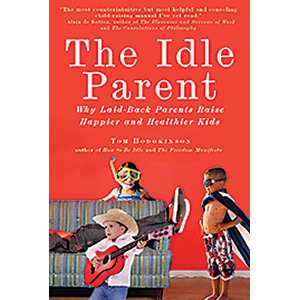
The Idle Parent – Manifesto
 Last week, while reviewing holiday wish lists, I let my daughters know that some items were on backorder. My oldest remarked, “What’s Santa been doing all year?” It struck me that perhaps I stressed productivity a bit too much and that maybe I needed to embrace of bit more of Tom Hodgkinson’s The Idle Parent so my kid wouldn’t consider Santa a slacker.
Last week, while reviewing holiday wish lists, I let my daughters know that some items were on backorder. My oldest remarked, “What’s Santa been doing all year?” It struck me that perhaps I stressed productivity a bit too much and that maybe I needed to embrace of bit more of Tom Hodgkinson’s The Idle Parent so my kid wouldn’t consider Santa a slacker.
While I could do without Hodgkinson’s seventeenth and eighteenth century philosophy quotes, I see the wisdom in the majority of beliefs on parenting and considered posting his manifesto as a constant reminder to relax and enjoy the moment. Here are some highlights from it:
- · We pledge to leave our children alone.
- · We reject the rampant consumerism that invades children’s lives from birth.
- · We drink alcohol without guilt.
- · An idle parent is a thrifty parent.
- · An idle parent is a creative parent.
- · We try not to interfere.
- · We play in the fields and forests.
- · We both work as little as possible, particularly when the kids are small.
- · Time is more important than money.
- · Happy mess is better than miserable tidiness.
Of course, the predicament that the idle parent faces involves balancing indulgence and discipline. “The mission of the idle parent,” Hodgkinson writes, “is to let kids play while avoiding spoiling them.” If you can do so, you’ll end what Hodgkinson believes is the most painful manifestation of “our wrongheaded modern parenting techniques” – whining.
The first step is to “maintain a routine with a light touch and flexibility.” This way you’ll be able to avoid “being a slave to the caprices of the child” because you’ll be able to look forward to a peaceful evening without the kids. The second step in eliminating whining is to stop your own. Hodgkinson claims we must “resist the call to work ever harder and longer hours…Overwork will kill you. It will wreck your life and your kids’ lives. And it will lead to whining – and as we agreed, the whining must stop.”
According to The Idle Parent, “We need to get out of our heads the idea that saying ‘no’ is an act of unkindness.” The sooner you learn to say ‘no’ the sooner you can become the idle parent your child yearns for, as “the idle parent is spontaneous, joyful, free of resentment and therefore better company.” Essentially, you need to think of saying ‘no’ as taking control of your life. As Hodgkinson points out, “Whining and complaining arise from powerlessness.” Once you have power over your life, your children will follow. (That is so long as you can avoid the temptation to interfere.)
“Idle parents will never sacrifice themselves to their children. They will carry on with their own lives, and the kids will learn and grow in the slipstream.” But make no mistake, the idle parent isn’t selfish. Hodgkinson argues, “They will respect their little creatures and observe their ways with interest,” never forgetting a “certain sense of gratitude toward them for being in (their) lives.” After all, years from now, your children won’t remember every little thing you did for them, but Hodgkinson does believe they will remember how you were with them. So give your kids the two things The Idle Parent claims they need most this holiday season – the space and time to grow.
Don’t forget to like Parenting by the Book on Facebook for updates on blog posts.
Read my other blog Befriending Forty at http://befriendingforty.blogspot.com and find out what happened when the person I thought I’d be met the person I actually became.






